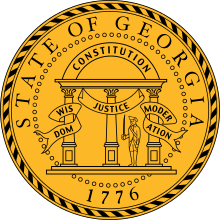Hugh Dorsey
| Hugh Dorsey | |
|---|---|
 | |
| 62nd Governor of Georgia | |
|
In office June 30, 1917 – June 25, 1921 | |
| Preceded by | Nathaniel E. Harris |
| Succeeded by | Thomas W. Hardwick |
| Personal details | |
| Born |
July 10, 1871 Fayetteville, Georgia |
| Died | June 11, 1948 (aged 76) |
| Resting place | Westview Cemetery |
| Political party | Democratic |
| Spouse(s) | Adair Wilkinson |
| Alma mater | University of Georgia |
| Occupation | Lawyer |
| Religion | Methodist |
Hugh Manson Dorsey (July 10, 1871 – June 11, 1948) was an American lawyer who was notable as the prosecuting attorney in the Leo Frank trial of 1913. He was also a politician, a member of the Democratic Party who was twice elected as the Governor of Georgia (1917–1921), and jurist, who served for more than a decade as a superior court judge (1935–1948) in Atlanta.
Early life and education
Hugh Dorsey was born in Fayetteville, Georgia in 1871.[1] At the age of 8, he moved with his family in 1879 to Atlanta, which was growing rapidly and had more economic opportunity. His father was an attorney there.[1]
Dorsey graduated from the University of Georgia in 1893.[1] After studying law at the University of Virginia, Dorsey joined his father's law firm in Atlanta in 1895. [2]
Marriage and family
Dorsey married Adair Wilkinson and had two children.[1] Dorsey's sister, Sarah, married Luther Rosser Jr., son of attorney Luther Rosser, who was chief counsel defending Leo Frank at trial and subsequent appeals.[3]
Career
After working for several years with his father, in 1910 Dorsey was appointed solicitor general of the Atlanta Judicial Circuit.[1] He was a member of the Democratic Party,[4] as were most established Whites in the South after Reconstruction. In 1913, Dorsey was prosecuting attorney (serving as the solicitor general of the Fulton County Superior Court)[5] at the trial of Leo Frank, who was indicted for the murder of young factory worker Mary Phagan. Achieving conviction amid intense media coverage, Dorsey became famous.[1] Frank, a Jewish northerner from Brooklyn, was eventually lynched by a mob two months after Governor John Slaton commuted his death sentence to life in prison.
Dorsey's victory in the Frank-Phagan case contributed to his political popularity and being elected for two consecutive two-year terms as the Governor of Georgia from 1917 to 1921.[4]
Later he ran for the U.S. Senate but was defeated.[1] Dorsey served as a superior court judge in Atlanta from 1935 until his death in 1948.
He is buried in Westview Cemetery in Atlanta.[1]
In popular culture
Over the decades, the dramatic story of Frank's trial and lynching (after his death sentence was commuted) was adapted into many forms. He is seen in the 1964 fiction Profiles in Courage and 1988 TV-miniseries The Murder of Mary Phagan, where Dorsey was portrayed by the actor Richard Jordan, and in the Broadway musical Parade, where he was portrayed in the original cast by Herndon Lackey.
References
- 1 2 3 4 5 6 7 8 Stallings, Patricia. "Hugh M. Dorsey (1871-1948)". New Georgia Encyclopedia. Retrieved 3 January 2015.
- ↑ "June 11", This Day in Georgia History, Georgia Info, compiled by Ed Jackson and Charles Pou, Carl Vinson Institute of Government, Digital Library of Georgia, accessed Jul 20, 2010
- ↑ Oney 2003, p. 616.
- 1 2 "Georgia Governor Hugh Manson Dorsey". National Governors Association. Retrieved 3 January 2015.
- ↑ Oney 2003, p. 92.
Sources
Oney, Steve. And the Dead Shall Rise: The Murder of Mary Phagan and the Lynching of Leo Frank. Pantheon Books, 2003.
External links
- Works by or about Hugh Dorsey at Internet Archive
- Arguments of Hugh M. Dorsey in the 1913 Leo Frank Murder Trial Some of Solicitor General Hugh Manson Dorsey's nine hours of closing arguments made on Aug. 22, 23 and 25, 1913 in the Atlanta Judicial Circuit. Held at Internet Archive in Adobe PDF format, 146 pages.
- Georgia State Archives Roster of State Governors
- Georgia Governor's Gravesites Field Guide (1776–2003)
- Hugh M. Dorsey historical marker
- Hugh Manson Dorsey at Find a Grave
| Political offices | ||
|---|---|---|
| Preceded by Nathaniel E. Harris |
Governor of Georgia 1917–1921 |
Succeeded by Thomas W. Hardwick |
